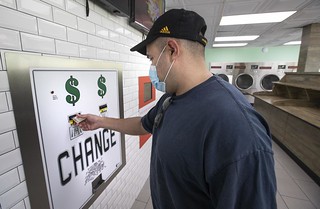
PREV ARTICLE
NEXT ARTICLE
FULL ISSUE
PREV FULL ISSUE
THIS ISN'T AMERICA'S FIRST COIN SHORTAGEThe current coin shortage is a far cry from a full blown coin disappearance, which happened in the U.S. during the Civil War when rising specie prices drove silver and gold coins (and ultimately copper coins, too) out of circulation. This article references the 1862 specie panic; the ANA's Doug Mudd gets a quote, too. Here's an excerpt. -Editor
The COVID-19 pandemic has caused a coin shortage, and it's hitting small-business owners, big retailers and everyday shoppers — especially those who don't have credit or debit cards — in ways big and small. The main way coins circulate through the economy is via store transactions and coin recyclers, according to the U.S. Mint. But as the coronavirus spread, stores closed and visits to essential retailers plunged. That means coins are stuck inside people's homes. When stores need coins, they turn to banks. If the request is more than what the bank has on hand, it can relay that order up the supply chain to the Federal Reserve, the U.S. Treasury and, finally, the U.S. Mint. But when one part of the chain is disrupted, it slows the entire process. “You had a breakdown in the system because of the closing of the stores and banks,” said Douglas Mudd, curator and museum director of the American Numismatic Association's Edward C. Rochette Money Museum in Colorado Springs, Colorado. “And when it started up again, there was a bit of an overdemand.” “Lower-income consumers tend to transact more in cash,” said Adrienne Harris, professor of the practice at the University of Michigan and former special assistant to President Obama for economic policy. “It makes things harder for low-income consumers to get the very basic things they need.” Even before the coin shortage, some businesses wary of handling cash during the coronavirus era were asking customers to use only card or contactless payment methods. That renewed debate over the merits and disadvantages of a so-called cashless society. During a recent shopping trip to a Smart & Final store in California's San Fernando Valley, Michael Knapp's total bill came to $36.75. He paid $40 in cash, which he always uses because he doesn't have a credit or debit card. He had hoped to get the change in quarters so he could use them to do laundry, but store employees told him they could not give him even one. In the past, “quarters were always something you could find,” said Knapp, 64. Knapp ended up getting the change in store credit. He said he's not sure what he'll do if the coin shortage continues. As for his laundry, he happened to wash a lot of clothes right before the shortage, so he's OK — for now. This isn't America's first coin shortage. One notable one was during the Civil War, when Americans hoarded coins out of fear, as well as concerns about the value of newly introduced paper money, according to the publication Coin World. Congress then passed a law allowing people to use postage stamps as currency, which subsequently led to a run on post offices, said Rebecca Spang, professor of history at Indiana University, where she teaches courses on the history of money. Stamps at the time had adhesive backs, making it more likely that they stuck together in a wallet. So months later, the U.S. government started printing what's known as postal currency — a bill-shaped paper smaller than a business card that had an image of a stamp, along with the denomination. That coin shortage lingered for decades, largely ending by the 1890s, Spang said. Others followed from time to time, including one in the 1960s caused by surges in demand.
To read the complete article, see:

Wayne Homren, Editor The Numismatic Bibliomania Society is a non-profit organization promoting numismatic literature. See our web site at coinbooks.org. To submit items for publication in The E-Sylum, write to the Editor at this address: whomren@gmail.com To subscribe go to: https://my.binhost.com/lists/listinfo/esylum All Rights Reserved. NBS Home Page Contact the NBS webmaster 
|
